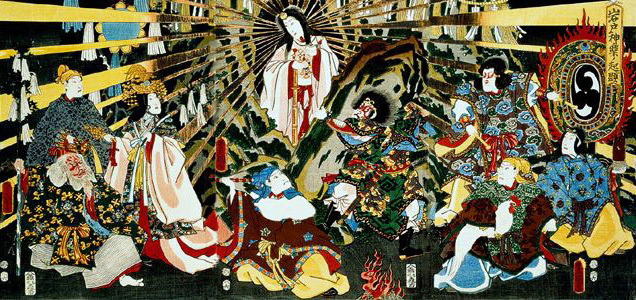I heard today that the Emperor of Japan had sex with the Sun Goddess, Amaterasu.
Crazy, right? How did this not make the news sooner?
Apparently, the coital union has led to all sorts of trouble for the Japanese economy, not to mention the creation of a general, “atmosphere ruled by the powers of darkness.”
Ouch.
And…confusing.
Sun Goddesses typically are associated with the Sun, and the Sun gives off light. But somehow this goddess actually is responsible for darkness…
I’m sorry. This isn’t lining up right in the pagan part of my brain.
Oh, yes! That’s right. I forgot that the darkness spread by this particular Sun Goddess (and, probably all the other one’s, too) comes from Satan.
Check. Got it. Satan.
Take A Breath of Fresh Air
This real-world, modern mythology was offered up by C. Peter Wagner, the head honcho of the New Apostolic Reformation, a small but increasingly influential Christian sect, in an interview he gave on the NPR program, Fresh Air. As always, Jason at the Wild Hunt was ahead of the curve on this subject, and has written extensively about the movement’s history and development on his blog (I encourage you to pay his site a visit and read through the past posts on “Dominionism”).
What I want to contribute to this conversation is something I haven’t seen elsewhere in the Pagan blogosphere. I’ve read a lot about how frustrated we all are with Dominionism, and how threatened we all feel by the New Apostolic Reformation’s movement in political and social circles. I’ve watched as many of us organized to counter “maleficent” prayer events with coordinated, magickal workings, and I’ve been amazed at how willingly we consent to this kind of “spiritual warfare.” But I haven’t heard anyone speaking to what we Pagans and Polytheists have in common with members of the New Apostolic Reformation.
I’d like to suggest that Pagans and Polytheists pay attention to Mr. Wagner and his fellow “apostles” not because they are a threat to our well being (although they, and their political counterparts, may be), but rather because they are opening a door for conversation with the greater public about the existence of multiple, distinct, conscious, spiritual beings.
Wagner truly believes that the Japanese Sun Goddess exists. And he truly believes that she got freaky with the Emperor. His cosmological paradigm allows for the existence of deities other than the Abrahamic God. Given, he characterizes them as “demons,” and he attributes their work in the world to Satan, which doesn’t sit well with Pagans and Polytheists. We typically frown upon recontextualizing one deity through another’s pantheon. That’s just rude.
But, he believes in their existence. He believes that they are beings who literally interact with humanity.
Perhaps the question we should be asking ourselves is – do we?
Creating A Space For Dialogue
At my blog, Bishop In The Grove, I often explore the subject of interfaith dialogue between Christians and Pagans. It’s a topic of great interest to me. As some commenters on my blog have pointed out, it’s unlikely that Pagans will have what we consider to be respectful religious dialogue with people like Mr. Wagner, who view our Gods and Goddesses as “demons,” and who actively seek to convert non-Christians.
I’ll concede to that.
But Mr. Wagner has inadvertently made a case for polytheism, albeit a distorted one. There’s a chance here for Pagans and Polytheists to slip into the conversation and offer a different perspective. That is, if we actually believe that our Gods and Goddesses are real.
If we don’t, there’s little reason to be troubled my Mr. Wagner’s theology. If our Gods are but aspects of our own psyche, what harm does it do for them to be characterized as real, sentient demons by representatives of a small, Christian sect? We can easily look at their assertion and label it fantasy, or delusion.
But the point here is that Mr. Wagner is not talking about Gods and Goddesses as metaphor or archetype. He believes they’re real beings.
Now if we, too, believe that our Gods are moving and living in the world, inextricably woven into the fabric of our Earthly experiences, and that they are interacting with their devotees and affecting reality on a daily basis, then we have a responsibility to address the misinformation that Mr. Wagner is spreading. We also have to accept that Mr. Wagner, and others who believe what he believes about the spiritual world, are not outright “crazy” for what they believe. They’re just misinformed.
Preach, Pagans. Preach.
We don’t evangelize — it’s not our thing — and I’m not suggesting we start. I am, however, hoping that we might see in this whole situation with Mr. Wagner and the New Apostolic Reformation the chance to have our own witness of the spirit be heard. We can testify as good as any Christian about how the Divine moves through our lives, and we must do so with the unshakable conviction that our Pagan or Polytheist testimony is valid and worthy of being recognized.
When what we hold sacred is mischaracterized, we are being given a gift; an opportunity to spread our own good news about the mystical, magical, God and Goddess-filled world in which we live.
Don’t pass up on that opportunity.
Teo Bishop blogs over at Bishop In The Grove here at Patheos.
















